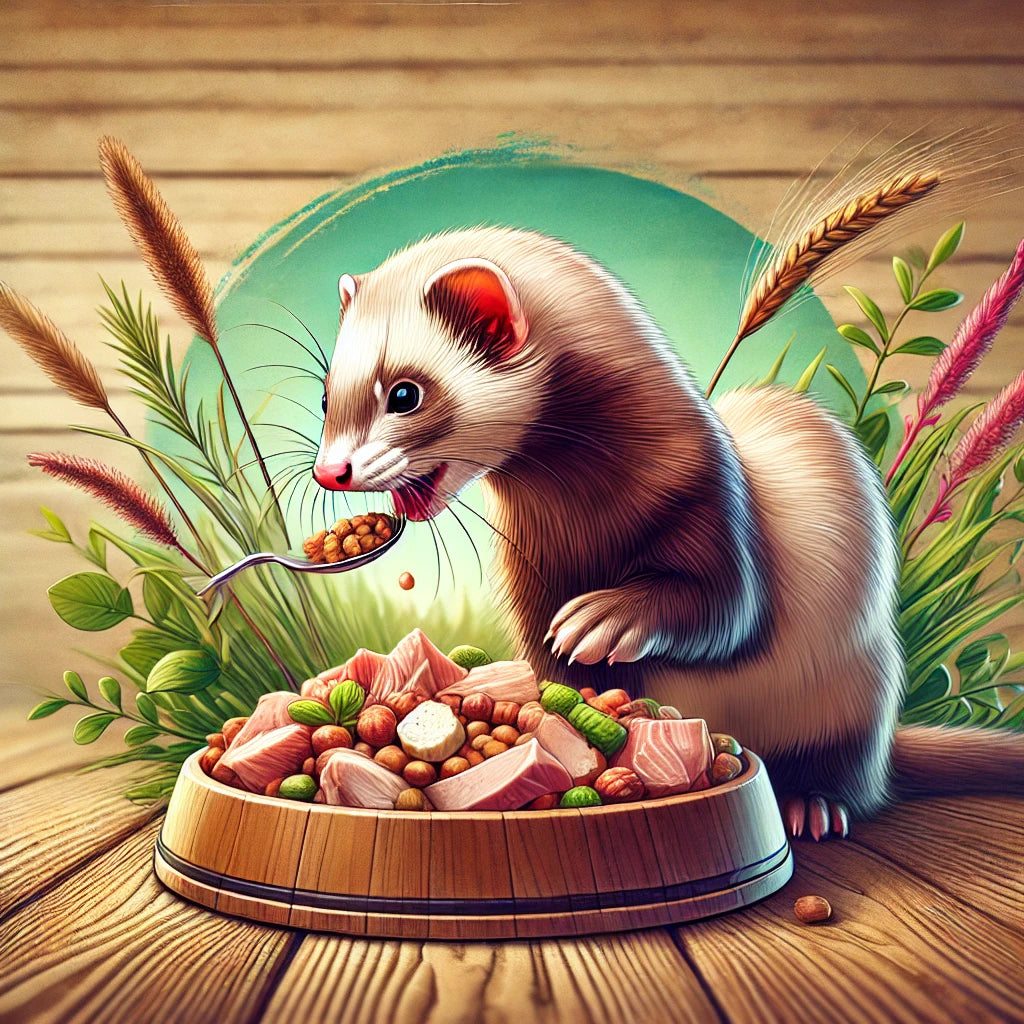
The Ultimate Guide to Choosing the Best Ferret Food
Share
If you’re a ferret owner, you know how important it is to provide the right diet for your furry friend. These playful creatures aren’t just adorable—they’re also obligate carnivores, meaning they need a diet rich in animal protein to stay healthy and energetic. In this guide, we’ll explore what ferret food is best, how to choose the right diet, and answer some of the most common questions about feeding ferrets.
What Makes Ferret Food Special?
Ferrets have unique dietary needs. Unlike cats or dogs, ferrets have short digestive tracts and high metabolic rates, so they need food that’s easy to digest and packed with nutrients. Here's what makes ferret food special:
- High in Protein: Ferrets need at least 30-40% protein in their diet, ideally from animal sources.
- Low in Carbohydrates: These critters can’t process carbs well, so avoid foods with grains or fillers.
- Rich in Fat: Fat is an important energy source for ferrets, making up around 15-20% of their diet.
- Minimal Fiber: Ferrets don’t need much fiber, as it’s hard for them to digest.
What Ferret Food is the Best?
High-Quality Commercial Ferret Food
The best place to start is with specially formulated ferret food. These products are designed to meet their nutritional needs, ensuring your ferret gets the right balance of protein, fat, and vitamins. Look for these features when choosing a commercial ferret food:
- Protein Source: Ensure the first ingredient is meat or animal-based, such as chicken or turkey.
- No Grains or Fillers: Avoid products with corn, soy, or wheat, as they’re not suitable for ferrets.
- Natural Ingredients: Stay away from artificial colors, flavors, or preservatives.
Recommended Brands:
- Marshall Premium Ferret Diet
- Wysong Ferret Epigen 90
- Kaytee Forti-Diet Pro Health
Raw Diet for Ferrets
Some ferret owners prefer a raw diet, which mimics what ferrets would eat in the wild. This can include:
- Raw chicken, turkey, or rabbit
- Organ meats like liver or kidneys
- Whole prey, such as mice
Pros:
- Mimics natural diet
- High in protein and fat
Cons:
- Time-consuming to prepare
- Requires proper handling to avoid bacteria
Can Cats Eat Ferret Food?
If you’re in a pinch, high-quality kitten food can serve as a temporary substitute. Kitten food often has higher protein and fat content than adult cat food, making it more suitable for ferrets. However, this should only be a short-term solution.
How to Choose the Right Ferret Food
Read the Ingredients
When shopping for ferret food, the ingredients list is your best friend. Here’s what to look for:
- First Ingredient: Should be meat or animal-based protein.
- Avoid Grains: Stay away from anything with corn, soy, or wheat.
- High Protein Content: At least 30% protein is essential.
Consider Your Ferret’s Age
Ferrets’ dietary needs change as they age:
- Kits (Baby Ferrets): Need high protein and fat to support growth.
- Adults: Balanced protein and fat for maintenance.
- Seniors: Easily digestible food to support aging systems.
Monitor Your Ferret’s Health
Pay attention to your ferret’s coat, weight, and energy levels. A healthy ferret should have a shiny coat, good muscle tone, and plenty of energy. If you notice any changes, consult your vet to see if their diet needs adjustment.
Conclusion
Feeding your ferret the right food is key to keeping them happy and healthy. Whether you choose high-quality commercial ferret food or a raw diet, ensure it’s high in protein, low in carbs, and tailored to your ferret’s needs.
Remember, a healthy ferret is a happy ferret! Got questions? Check out our FAQs or reach out for personalized advice.
FAQs
What should I never feed my ferret?
Avoid feeding ferrets fruits, vegetables, dairy, and sugary snacks. These can upset their stomachs and lead to health issues.
How often should I feed my ferret?
Ferrets have fast metabolisms and should eat multiple small meals throughout the day. Leave food available at all times, as they prefer to graze.
Can I give my ferret treats?
Yes, but choose treats specifically designed for ferrets or meat-based options like small pieces of cooked chicken. Avoid sugary or processed treats.